The mysterious story of a Seattle houseboat declared the Sovereign Nation of Tui Tui
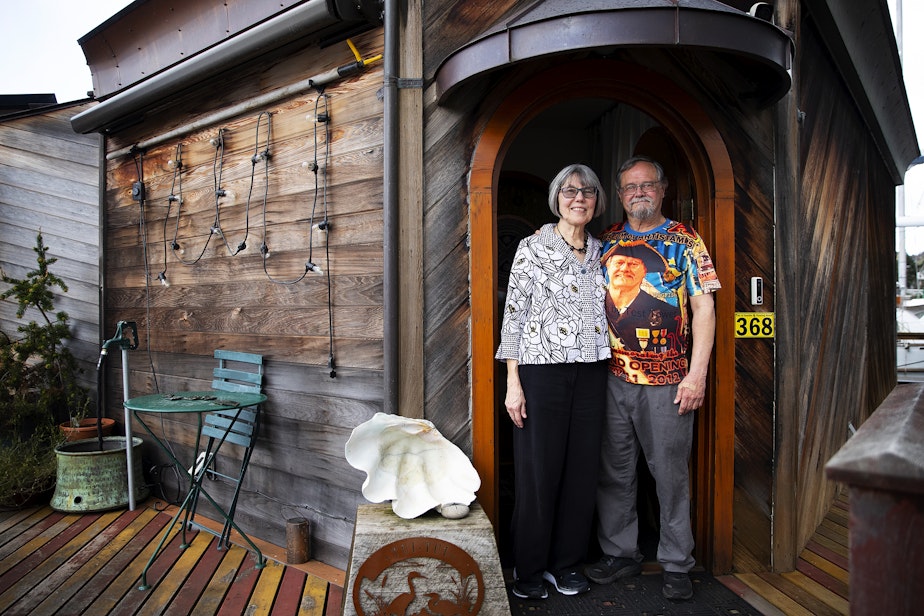
What's the story behind the Seattle houseboat that is also a sovereign nation? KUOW Wonders readers wanted to know. Have something you're wondering about? Tap the link above.
F
or more than 100 years, floating homes along the shores of Seattle lakes have attracted people who couldn’t afford to live ashore, including low-wage workers, bohemians, radicals, hippies, and occasionally criminals.
For almost as long as those floating communities have existed, they’ve been actively opposed by shoreline homeowners, who complain that the rows of houseboats (some in better shape than others) detract from their property value, attract riff-raff, and obstruct their view of the water.
Campaigns against houseboat communities combined with exorbitant moorage rate hikes led to hundreds of evictions in the 1970s. During that period, the number of Seattle houseboats dipped from thousands to hundreds.
Amid the uncertainty and unrest, one houseboat and its esoteric owners helped keep Seattle’s floating homes afloat and created their own magical nation-state in the process — Tui Tui of the Joyous Lake.
Sponsored
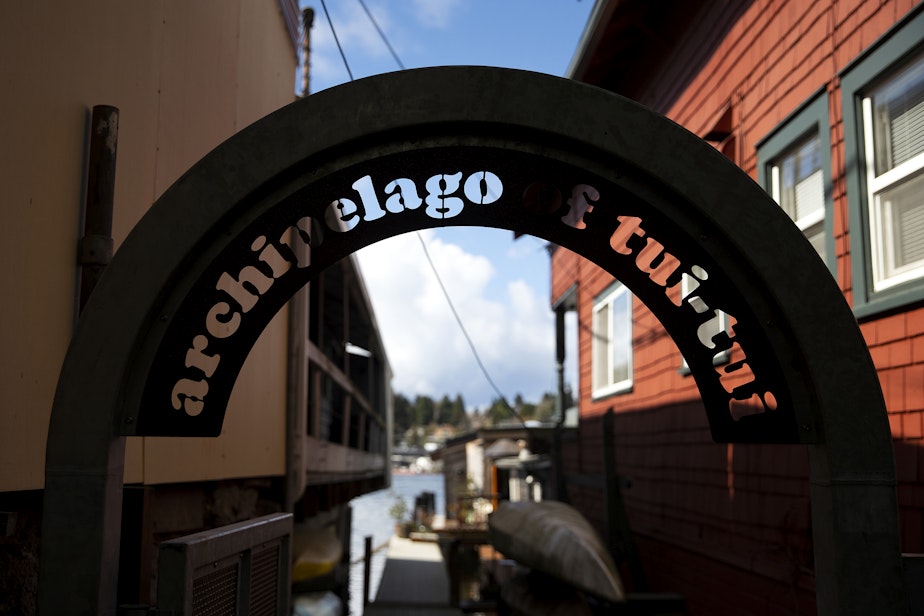
Robby Rudine and Janet Yoder, better known as Dogfish and Dragonfly, are the benevolent rulers of this self-proclaimed sovereign houseboat nation. While their single-story houseboat is not formally (or informally) recognized by the federal government, Dogfish and Dragonfly are hardly dissuaded.
In the nearly 40 years since they declared their houseboat independent, the couple has developed all the accouterments one would expect from the world’s tiniest, most eccentric landless country. A series of elaborate stamps designed by Dogfish document the history and historical figures that played a role in Tui Tui’s formation. A coat of arms by the houseboat gate features their motto, in Chinook Jargon, that roughly translates to, “It’s mighty nice supposing in the highly unlikely event it doesn’t rain.”
Dogfish notes that anyone who can help locate their missing and presumed stolen Tui Tui flag is eligible for a 1,000 nupee reward — nupees being the adopted currency of Tui Tui.

Sponsored
Whether one believes in Tui Tui, or considers pursuing a lost flag for a reward that has little to no monetary value, the houseboat nation played a key role in the colorful and contentious history of Seattle’s floating communities. In fact, Dragonfly and Dogfish’s court battle to avoid eviction in 1985 was a turning point that helped cement the rights of houseboat owners to continue dwelling along the shores of Seattle’s many joyous lakes.
The evictions of Seattle houseboats in the 1970s led to the creation of what is known today as the Floating Homes Association. The association fought to establish the Equity Ordinance, which provides houseboat owners with rights and protections.
But the ordinance had not been tested or challenged in court until Dogfish and Dragonfly stood up to their lake-lord of lore — the dreaded Garn.
The Battle of Garn
The rustic houseboat Dogfish and Dragonfly purchased for $8,000 in 1974 rested on log rafts that rocked whenever the wind blew, or when speedboats ripped past on Lake Union. The periodic rocking was slowly but surely causing the floating home to come apart at the seams.
Sponsored
It was almost unlivable during the winters, when cold air would seep in through the growing cracks and crevices. One particularly cold morning, Dogfish and Dragonfly awoke to find the water in their toilet frozen solid.
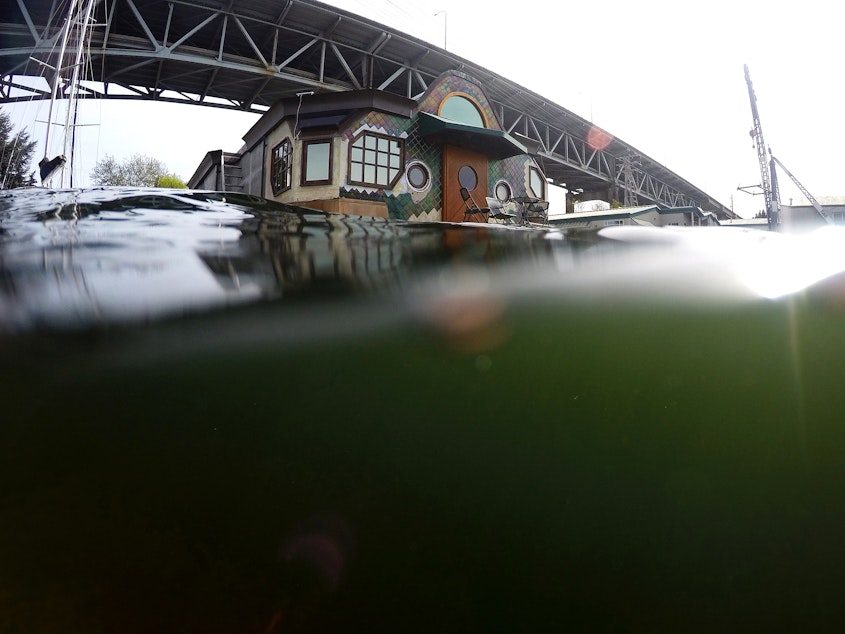
They decided something had to be done, but they knew their lake-lord, Garney Harris, would be their biggest obstacle. Harris, or “Garn” as they called him, was born in, lived in, and owned the house on pilings at the head of the dock, in addition to the dock itself, where Dragonfly and Dogfish and one other houseboat were moored.
Dragonfly described Harris as an old grump who modified every noun with “God-damn,” as in “God-damn hippies.” When Dragonfly and Dogfish showed Harris their plans to remodel their houseboat, he was immediately opposed. “No, no, no!” Harris said.
The war between lake-lord and house boaters escalated. Eventually, Harris decided he had had enough. He sent an eviction notice to Dragonfly and Dogfish and the other houseboat moored at the dock.
Sponsored
An ensuing lawsuit was the first to put Seattle’s Equity Ordinance to the test. If Dogfish and Dragonfly lost, it could mean the ordinance would be declared unconstitutional, putting the future of Seattle’s houseboat community on perilous waters.
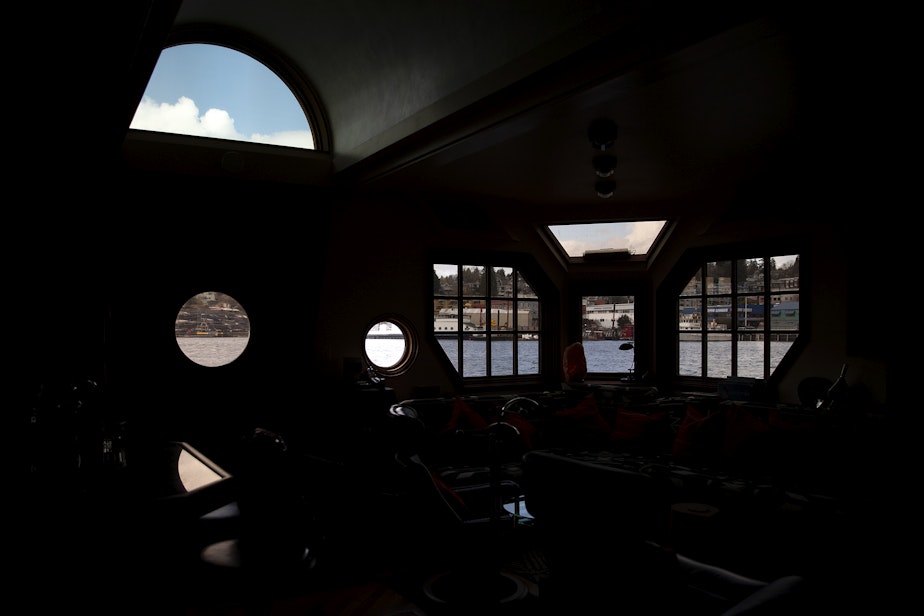
The night before the trial, the wife of the attorney for Dragonfly and Dogfish tried to put them at ease by casting the I Ching, a divination that is achieved by the repeated tossing of coins. The divination revealed I Ching Hexagram 58, the upper Tui, and the lower Tui — Tui Tui.
Tui means “the joyous” and “lake,” both of which struck Dragonfly and Dogfish as promising signs.
The next day at the trial, the judge, whose last name happened to be Tuai (pronounced “Tui”), made an initial ruling in favor of the lake-lord.
Sponsored
During a break in the proceedings, Dogfish and Dragonfly’s lawyer asked his clients what they thought Garney Harris really wanted. Dogfish responded that he didn’t want to have to deal with them, or houseboats, ever again. Above all, he wanted to be left in peace.
The lawyer suggested that they offer to buy the property, dock and all, from Harris for less than market value, with the caveat that Harris could live in his house rent-free for the rest of his life. Thus was born the Treaty of Garn.
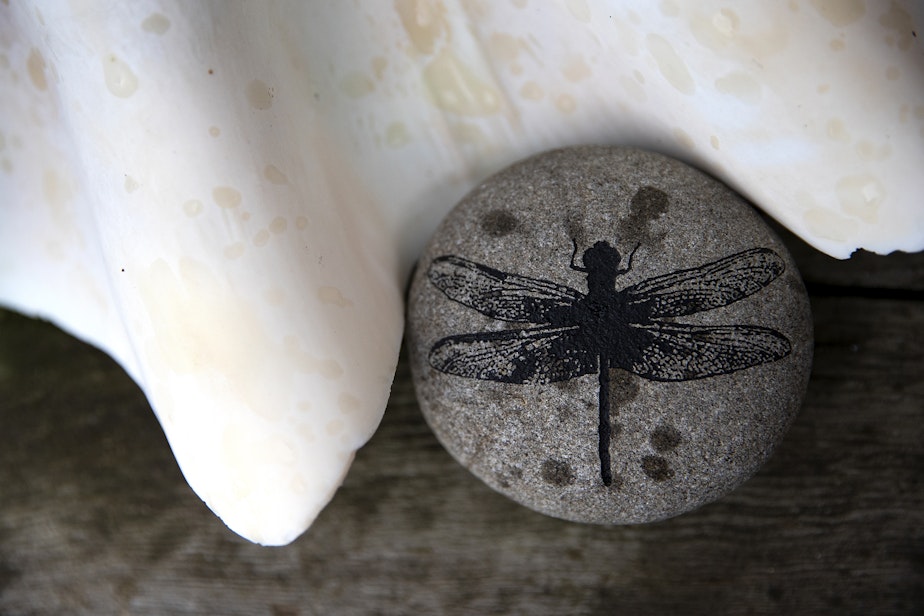
Feng shui houseboat
In an ode to the ruling and settlement, Dogfish designed a new houseboat in accordance with the I Ching. The built-in hot tub at the home's center has eight sides, each representing a “trigram” of the I Ching.
Dogfish and Dragonfly were married on their partially remodeled houseboat in May 1985. Six months later, they formally moved in and declared Tui Tui an independent nation.
Inside their front door is a coat of arms.
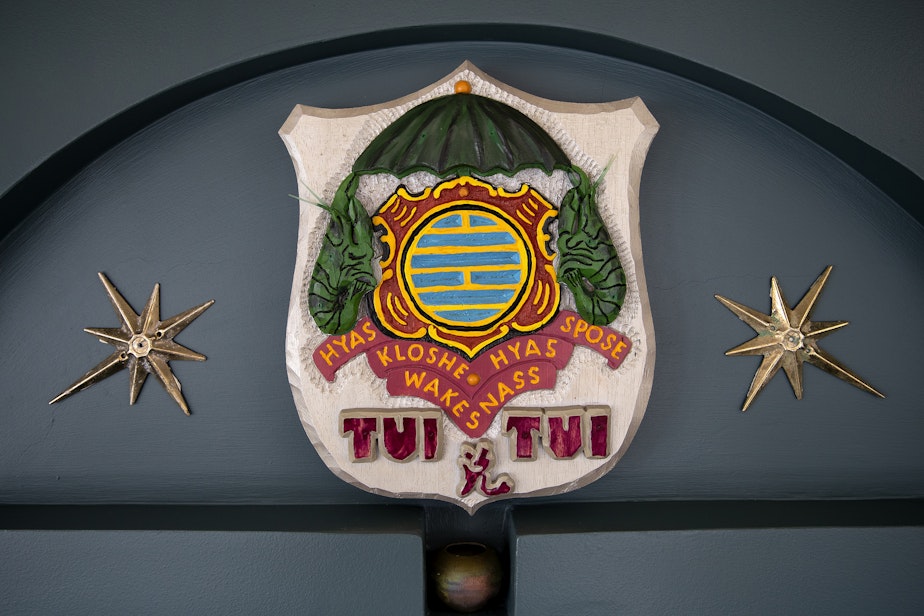
In his particular way of speaking that is both elaborate and elusive, Dogfish explained, “It’s surmounted by Bumbershoot splendant, flanked by log lobsters rampant. Bumbershoot splendant is crypto-heraldic parlance for an open umbrella.”
Below the coat of arms is a hole in the cement wall that was meant to be the final resting place for Doodley Squat, the cat who played a key role in Tui Tui’s origin story.
The reason Dragonfly and Dogfish found themselves suddenly needing to move in 1974 is that they had unexpectedly adopted a rambunctious kitten. They encountered the tiny fur ball darting about a local winery. The winery owner said if they didn’t take the kitten home, he would take it to the pound at the end of the day. But home was an apartment, and their apartment didn't allow pets.
The unexpected addition to their family inspired a rushed search for a new place to live and, on a whim, a houseboat. More than a decade later, when they remodeled the houseboat after the Treaty of Garn, they included an honored place below the Tui Tui coat of arms for their cat’s remains.
Doodley Squat had other plans.
“It's an empty cenotaph because she went off and made her own arrangements at the end of her life,” Dogfish said.
Dogfish tales
The houseboat where Dogfish and Dragonfly hold court is adorned with artwork, elaborate doors carved in symmetric symbols, and a black piano that required Dogfish to readjust the weight load of Tui Tui so the entire country did not tilt starboard.
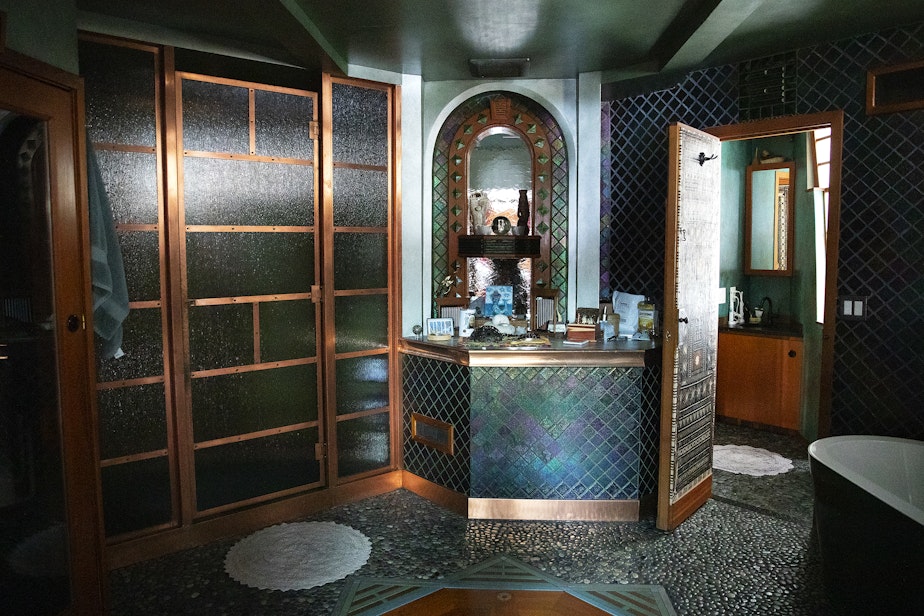
At the center of the floor in the polygonal room known as “The Water Kiva” is an elaborate wooden carving of I Ching symbols. According to Dogfish, the arrangement of the symbols would allow a future archeologist (who happened to understand I Ching) to properly align their houseboat were it to become unmoored and float away.
Dogfish made the dark glassy tile that adorns the walls using ash from Mount St. Helens. Dogfish and Dragonfly were married on the five-year anniversary of the volcano’s eruption in 1980.
Much of the painting in the houseboat was done by a woman who is a “tetrachromat,” someone who has an extra fourth cone in the back of their retina, and as a result sees colors not visible to most people.
The Treaty of Garn allowed Dragonfly and Dogfish to reposition their new remodeled houseboat (which they refer to as "the floating island of Grande Tui") from the inside mooring to the outside mooring.
“Lately we’ve been visited by a covert of coots, which is the proper term of venery for a group of coots,” Dogfish said. “We’ve been watching the coots and becoming coots ourselves.”
“Indeed,” Dragonfly added.
Preserving Lushootseed culture
Neither Dragonfly nor Dogfish are Native, nor do they claim Native American associations or ancestry. (“I’m from Texas,” Dogfish said. Dragonfly is originally from Eastern Washington.) But they were both greatly influenced by the renowned teacher, scholar, and storyteller of the Upper Skagit Indian Tribe — Vi (short for “Violet”) Hilbert.
In 1978, Dragonfly was looking to fill a language requirement while earning her master’s degree at the University of Washington; she stumbled upon a class taught by Hilbert called “Puget Salish.”
“I walked into her classroom in Denny Hall, and she began welcoming me and everyone in Lushootseed and began teaching us the language, and the stories, and teaching us about the culture,” Dragonfly recalled. “It just opened up a world that has been very rich and wonderful to be able to witness.”

Both Dragonfly and Dogfish became conversant in the Central Coast Salish language of Lushootseed through their 30-year friendship with Hilbert, who died in 2008.
Dragonfly wrote a book about Hilbert called “Where the Language Lives.” Proceeds from sales of the book go to Lushootseed Research, an organization founded by Hilbert to preserve and promote Lushootseed culture. Dogfish was one of the group’s original board members.
Dogfish said the decision to declare Tui Tui a sovereign nation was made, in part, out of deference to the Duwamish and Muckleshoot tribes.
“We're a protectorate holding it in trust for sorting out this complicated history between the Duwamish, Muckleshoot, and the United States of America,” Dogfish explained.
For Dragonfly, speaking Lushootseed is a way to honor the communities that have called Puget Sound home for millennia.
“There's something about simply using the language in the place where the language was always spoken, is still spoken, and will be spoken,” she said. “That's really powerful. It makes me feel more connected to this place.”
Museum of Artistamps
Vi Hilbert not only provided inspiration and motivation to Dragonfly and Dogfish, she also gave a Lushootseed name that translates to “Elevated House” to the only land-based building that is considered part of the Sovereign Nation of Tui Tui.
“Its independence theory is a bit more dubious,” Dogfish conceded. “We can’t float this away.”
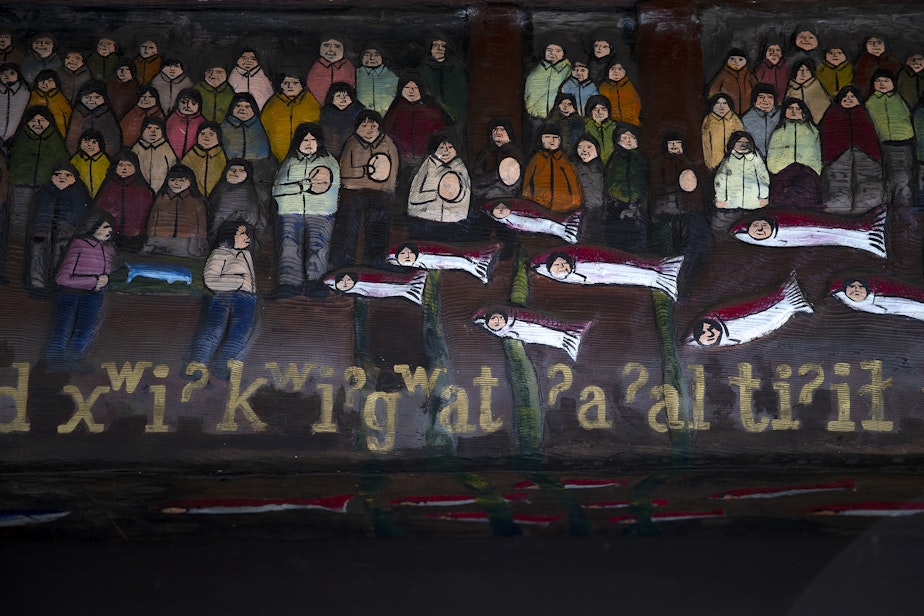
The four-story building just up the hill from the Tui Tui houseboat features a mural along its side by Hilbert’s son, Ron, that tells three different salmon-related stories.
Inside the building, 12 years ago, Dogfish opened the Museum of Artistamps, or MOA, one of only two museums in the U.S. dedicated to preserving the artistry of stamps, a lifelong passion of Dogfish.
He marked the opening of the museum with a speech in Lushootseed, which Dragonfly translated to the eclectic group that had gathered to celebrate.
The museum features artistic stamps from across the globe, including a collection of Tui Tui stamps created by Dogfish. The stamps are arranged in narrow wooden drawers that can be pulled out one at a time, allowing visitors to examine each glass-enclosed collection up close.
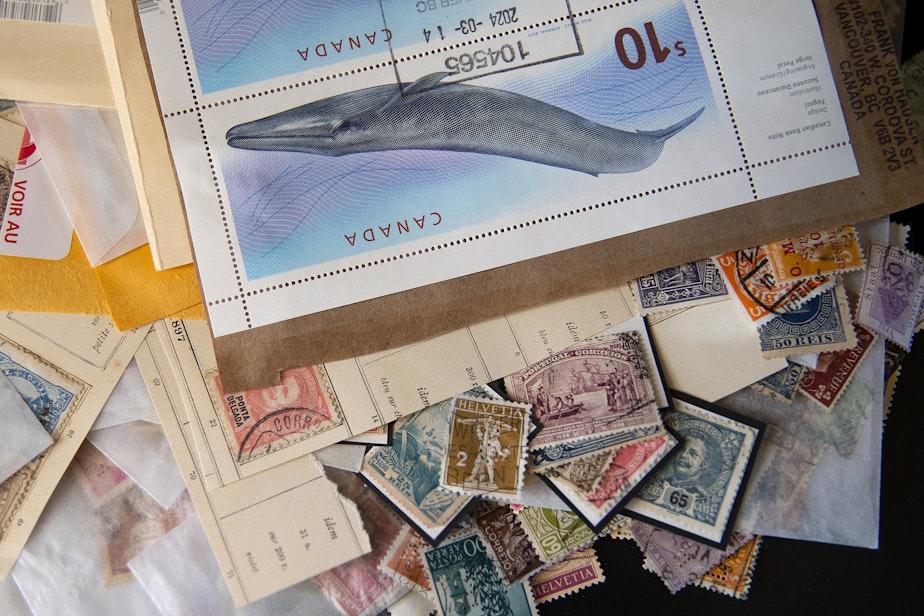
Every stamp has a backstory, which Dogfish moderates as visitors take in the intricate detail of their design.
Many of the stamps created by Dogfish celebrate anniversaries, like the silver jubilee stamp marking the 25-year anniversary of the Seattle Floating Homes Association, or a stamp showing Dragonfly and Dogfish on their wedding day to mark their 20-year anniversary. In the photo, a bearded Dogfish wears a white suit with a red bow tie and a white top hat.
While the stamps are not accepted as postage by the U.S. Postal Service, they are remarkable pieces of art, intricate, exact, and filled with messages and meaning.
“I do like embedding little tricks and references,” Dogfish said.
Nupees and Tuits
The nupee, Tui Tui's currency, "has been fixed at an exchange rate of 10 to the dollar," Dogfish explained. (It should be noted that this rate of exchange remains untested at U.S. banks.)
In the spirit of Tui Tui, Dragonfly purchased a basket made out of metal washers, which she and Dogfish refer to as "tuits," another ancient currency that is also a pun, as in, "I will complete whatever task I am procrastinating when I get around to it" (or "a round tuit").
“I thought, oh, that’s going to be perfect for [Dogfish],” Dragonfly said.
Dogfish will occasionally wear the nupee basket upside down on his head like a crown. He calls it “the brainwasher beanie.”
“It’s very uncomfortable to wear,” Dogfish said.

After posing for a quick photo as crowned king of Tui Tui, he removed the brainwasher beanie from atop his wavy gray hair and carefully placed it next to the altar at the center of the floating nation he created.
Editor's Note: This article was amended on Wednesday, April 3, to satisfy a few of Dogfish's minor post-publication quibbles.




